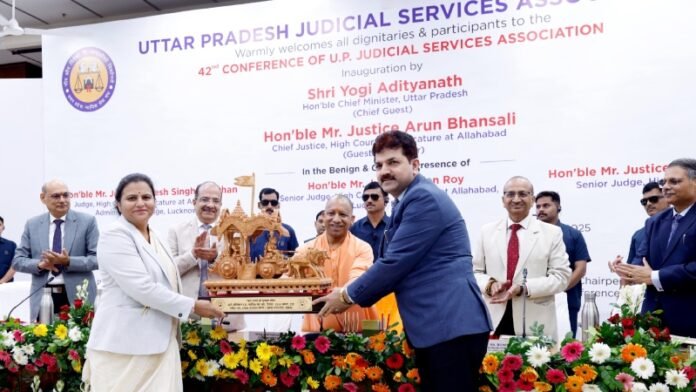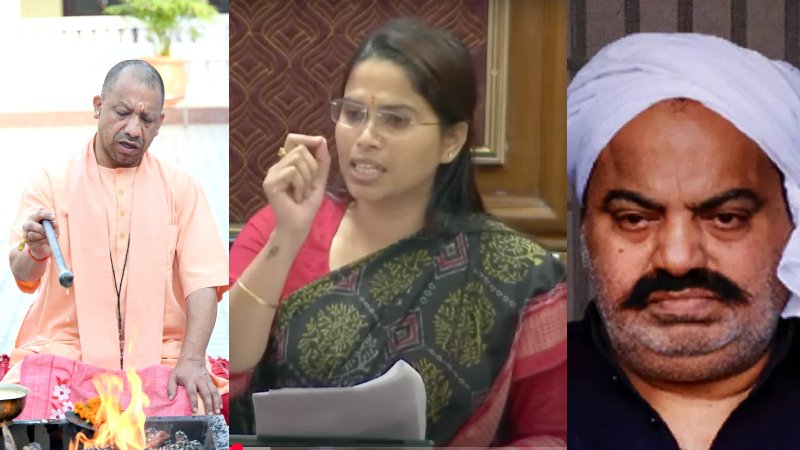On Saturday (23 August), Uttar Pradesh Chief Minister Yogi Adityanath stressed that justice must be both swift and accessible if India is to achieve its vision of becoming a developed nation. He was addressing the 42nd annual convention of the Uttar Pradesh Judicial Services Association, held at the Allahabad High Court bench premises in Lucknow.
The Chief Minister said that “good governance depends on a fast judicial system that inspires public trust.” He added: “When districts and the entire state move together on the path of development, only then can a developed India be realised.”
Disposal of Cases and Rising Challenges
Sharing data on the judicial performance, Yogi Adityanath said that district and trial courts in UP disposed of over 72 lakh cases in 2024. Despite this impressive figure, over 1.15 crore cases remain pending across the state.
“The fact that disposed cases are higher than newly filed ones shows that reforms are working. Speed in judicial processes strengthens public confidence,” the Chief Minister said.
Still, heavy case pendency remains a serious concern. Uttar Pradesh Judicial Services Association president Ranveer Singh highlighted that per 10 lakh population, there are only 11 judges in the state, while the Supreme Court has suggested 50 judges per 10 lakh people. In contrast, Gujarat has 15, Delhi has 20, and Madhya Pradesh has 23 judges per 10 lakh population.
“This shortage is the biggest reason why the public feels that cases drag on for years. Date after date is not just a cliché but a reality,” Singh underlined.
New Laws to Strengthen Justice Delivery
The Chief Minister praised the smooth implementation of three new central laws that came into force on 1 July 2024. Initially, there were fears of difficulties, but judges across Uttar Pradesh adapted quickly.
“These laws are no longer punitive in approach. They focus on strengthening justice itself, not merely punishment. This shift makes India’s democracy stronger and more humane,” Yogi said.
Judges too acknowledged the impact of these reforms. Justice Manish Kumar Gupta emphasised that district courts are the first face of justice for ordinary citizens, and the true measure of justice is not in constitutional provisions but in the fairness and timeliness of judgments delivered at the ground level.
Major Infrastructure Push for Courts
Yogi Adityanath also announced a series of financial approvals to improve court infrastructure and living conditions for judges:
- ₹62.41 crore sanctioned for new judicial residences in Prayagraj.
- ₹117 crore sanctioned for judges in the Lucknow bench.
- ₹99 crore released for staff and official residences.
- 896 housing units in Prayagraj received theoretical approval.
In addition, the state sanctioned 1,645 crore rupees for integrated court complexes in six districts. These facilities will handle motor accident cases, family disputes, commercial cases, and land acquisition matters under one roof.
Yogi further revealed that 381 new courts have been set up, including POCSO courts and fast-track courts dedicated to crimes against women.
Judges’ Welfare and Work Environment
In a lighter but significant remark, CM Yogi recalled his visit to a district court where judges were visibly struggling in the heat. “It was not just the natural heat, but also the heat from lawyers,” he quipped, before announcing that his government will install air conditioners in district judges’ courtrooms so that judicial officers can work in a better environment.
This announcement was met with applause from judges and lawyers present at the conference.
The Chief Minister also declared a ₹50 crore corpus fund for the security and welfare of judges.
“To deliver timely justice, judges must have safe, comfortable, and modern working conditions,” he said.
Security and Modernisation Measures
Between 2023 and 2026, the state government along with central aid has sanctioned over ₹262 crore for courtroom construction.
For district-level courts, additional funds have been released:
- ₹92 crore for security systems and CCTV cameras.
- ₹59 crore for fire safety equipment.
The Chief Minister confirmed that Uttar Pradesh is among the frontrunners in implementing recommendations of the Second National Judicial Pay Commission, releasing ₹1,092 crore for salaries and allowances.
The Judicial Training and Research Institute (JTRI) is also witnessing major upgrades, including:
- A 400-bed hostel worth ₹54 crore nearing completion.
- A sports complex worth ₹14 crore.
- New lecture halls, digital libraries, and IT-enabled classrooms with ₹8 crore allocation.
Voices from the Judiciary
The association’s president, Ranveer Singh, praised the government for efforts in improving conditions for judicial officers, noting that family courts, land acquisition tribunals, and motor accident claim tribunals have been set up under CM Yogi’s tenure.
However, he cautioned that severe staff shortage and inadequate infrastructure remain bottlenecks. He also flagged that the Allahabad High Court has only 33% of its sanctioned judge strength filled, demanding urgent appointments.
He also pushed for the Old Pension Scheme for retired judges, pointing out that several states are already implementing it.
Justice Manish Kumar Gupta delivered a powerful message that resonated with the gathering:
- District courts are the true face of justice, as most citizens never reach High Courts or the Supreme Court.
- “When a villager enters a courtroom, he does not measure justice by the Constitution, but by the fairness, conduct, and timeliness of the judge before him.”
- He stressed that “justice is not headlines but restoring dignity in people’s lives”—whether it is a widow’s right or a worker’s pension.
The Constitutional Spirit
Marking the ongoing Amrit Mahotsav of the Constitution, Yogi said the convention reflected India’s commitment to constitutional values. He acknowledged the judiciary’s role as a pillar of democracy and congratulated UP’s judicial officers for their dedication.
“Every reform and every step to make justice faster is a step towards building trust in our Constitution,” he said.
At the close of the event, Yogi released a judicial officers’ handbook and extended greetings to all members of the judicial fraternity present.
The 42nd convention of the UP Judicial Services Association highlighted both progress and challenges in India’s most populous state. On one side, the government showcased its record of infrastructure investments, new courts, pay reforms, and welfare schemes for judges. On the other, judicial voices reminded that the real test lies in reducing pendency, expanding judicial strength, and making justice truly accessible for the common man.


